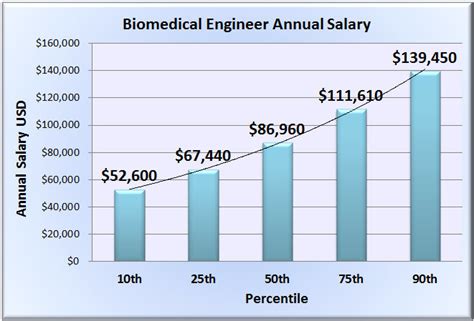Introduction
The field of biomedical engineering is rapidly expanding, driven by advancements in technology and the increasing demand for innovative medical solutions. With a master’s degree in biomedical engineering, individuals can pursue lucrative and rewarding careers in various industries, including healthcare, medical research, and biotechnology. This article delves into the career opportunities, salary expectations, and benefits associated with a master’s degree in biomedical engineering.

Career Opportunities
A master’s degree in biomedical engineering opens up a wide range of career opportunities in the following sectors:
- Medical Device Industry: Design, develop, and test medical devices, implants, and equipment.
- Healthcare Management: Manage healthcare operations, develop policies, and improve patient outcomes.
- Medical Research: Conduct research on diseases, develop new treatments, and evaluate medical technologies.
- Biotechnology: Develop and produce drugs, vaccines, and other biological therapies.
- Academia: Teach and conduct research in biomedical engineering programs.
- Government and Regulatory Agencies: Regulate medical devices, drugs, and biotechnology products.
Salary Expectations
According to the Bureau of Labor Statistics (BLS), the median annual salary for biomedical engineers with a master’s degree was $97,410 in May 2021, while the top 10% earned over $162,940. Industry, experience, and location can significantly impact salary expectations.
Factors Influencing Salary
The following factors can influence the salary of biomedical engineers with a master’s degree:
- Industry: Salaries tend to be higher in the pharmaceutical and biotechnology industries.
- Experience: With more experience, salaries generally increase.
- Location: Salaries are typically higher in urban areas and states with a strong healthcare sector.
- Specialization: Specialized skills in areas such as biomaterials, medical imaging, or tissue engineering can command higher salaries.
- Certifications: Certifications from professional organizations can enhance earning potential.
Benefits of a Master’s Degree in Biomedical Engineering
Obtaining a master’s degree in biomedical engineering offers several benefits:
Enhanced Career Opportunities:
* Opens doors to senior-level positions in various industries.
* Qualifies for roles that require advanced knowledge and skills.
Higher Salary Potential:
* Master’s degree holders generally earn higher salaries than those with only a bachelor’s degree.
* Salary premiums are particularly significant in specialized fields.
Improved Job Security:
* The healthcare sector is growing, leading to increased demand for biomedical engineers.
* Master’s degree holders may have greater job security during economic downturns.
Personal and Professional Growth:
* Enhances technical knowledge and skills in biomedical engineering.
* Develops analytical, problem-solving, and research abilities.
* Provides a competitive edge in the job market.
Table 1: Salary Expectations for Biomedical Engineers with a Master’s Degree
| Industry | Median Annual Salary (May 2021) |
|---|---|
| Medical Device | $99,390 |
| Healthcare Management | $98,960 |
| Medical Research | $95,230 |
| Biotechnology | $94,460 |
| Academia | $79,940 |
| Government and Regulatory Agencies | $89,390 |
Conclusion
A master’s degree in biomedical engineering offers significant career opportunities, higher salary expectations, and numerous benefits. With the healthcare industry’s ongoing growth and technological advancements, the demand for skilled biomedical engineers is expected to continue rising, making it an excellent investment for career success. By specializing in areas of interest and pursuing professional development opportunities, biomedical engineers can maximize their earning potential and make meaningful contributions to the field.
Additional Resources for Career Development
- Biomedical Engineering Society
- Institute of Electrical and Electronics Engineers (IEEE) Engineering in Medicine and Biology Society
- American Institute for Medical and Biological Engineering (AIMBE)
Table 2: Salary Expectations by Location
| State | Median Annual Salary (May 2021) |
|---|---|
| California | $109,540 |
| Massachusetts | $102,660 |
| New York | $99,650 |
| Texas | $97,670 |
| Pennsylvania | $96,520 |
| Florida | $94,970 |
Table 3: Salary Expectations by Specialization
| Specialization | Median Annual Salary (May 2021) |
|---|---|
| Biomaterials | $103,860 |
| Medical Imaging | $101,290 |
| Tissue Engineering | $98,950 |
| Biosensors | $96,320 |
| Bioinformatics | $94,750 |
| Computational Biomedical Engineering | $93,560 |
Table 4: Benefits of a Master’s Degree in Biomedical Engineering
| Benefit | Description |
|---|---|
| Enhanced Career Opportunities | Opens doors to senior-level positions and specialized roles. |
| Higher Salary Potential | Higher earning potential compared to bachelor’s degree holders, especially in specialized areas. |
| Improved Job Security | Increased demand for biomedical engineers in the growing healthcare sector. |
| Personal and Professional Growth | Develops technical knowledge, skills, and leadership abilities. |
| Innovation Hub | Biomedical engineers play a crucial role in developing innovative medical technologies and treatments. |
